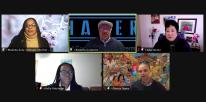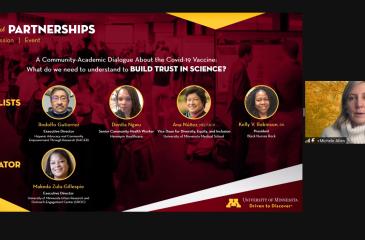The 2021 Power of Partnerships event moved online for a socially-distanced celebration of community-engaged research and a panel discussion. This year’s event focused on the theme, “A Community-Academic Dialogue about the Covid-19 Vaccine: What do we need to understand to build trust in science?”
Over 200 participants registered to join the discussion with grantees from CTSI’s Community Engagement to Advance Research and Community Health (CEARCH) and the Medical School’s Program in Health Disparities Research (PHDR) and a panel of leaders from Minnesota communities. The event was co-sponsored by the School of Public Health’s Health Equity Work Group (HEWG) and the Department of Pediatrics’s Healthy Youth Development - Prevention Research Center. Participants joined breakout sessions and viewed poster presentations from grantees, followed by a Q&A session.

Panel moderator Makeda Zulu-Gillespie with panelists Rodolfo Gutierrez, Denita Ngwu, Ana Núñez, and Kelly V. RobinsonThe panel conversation was moderated by Makeda Zulu-Gillespie, MPA, Executive Director, University of Minnesota Robert J. Jones Urban Research and Outreach-Engagement Center (UROC), with panelists:
- Rodolfo Gutierrez, Executive Director, Hispanic Advocacy and Community Empowerment Through Research (HACER)
- Denita Ngwu, Senior Community Health Worker, Hennepin Healthcare
- Ana Núñez, MD, FACP, Vice Dean for Diversity, Equity and Inclusion, University of Minnesota Medical School
- Kelly V. Robinson, RN, President, Black Nurses Rock
This timely conversation focused on creating trust in research products, especially the COVID-19 vaccine; what barriers may exist that prevent people from getting the vaccine, particularly in communities historically underserved and underrepresented in healthcare research; and how researchers and community members can align and act to address these barriers.
Key takeaways
- People want information before they make a decision. Panel member Kelly Robinson shared, “...there’s this misconception that people of color just don’t want [the COVID vaccine.] And that’s not so, they just want answers, they want to understand. They want the details. And I think it’s important that we give it to them.” When trained professionals take time to listen to questions and concerns and share the science behind the vaccine, they see higher success in getting people to take the vaccine.
- Messaging is important. Current academic and clinical conversation highlights vaccine hesitancy, which only leads to more skepticism. A better approach is to create unified messaging, both in our own communities and in the media, that shares facts and creates confidence.
- Who delivers the message is important. When trusted members of someone’s own community (members of the Power of Partnerships panel were named as an example) share positive messaging around the vaccine as a research product, members of their respective communities are more likely to feel confident getting the vaccine.
- Access is crucial. Not everyone has the same access to transportation, time off from work, and other factors that could prevent them from receiving healthcare and the COVID-19 vaccine. When clinicians offer healthcare solutions, these barriers need to be taken into account and addressed to create healthcare equity.
- Build a relationship with communities and follow up. For researchers in particular, visiting a community to get data or samples and then not engaging with the community as people creates mistrust. Getting directly involved with communities and their activities creates more insight to their needs, and following up to share results of the research is just as important.
CTSI looks forward to continuing this important conversation and congratulates our grantees on their hard work!
Power of Partnerships poster presentations 2021
Lung cancer screening in urban clinic serving Native Americans
Abbie Begnaud, MD; Wyatt Pickner, MPH; Antony Stately, PhD; and Anderson M
Meet them where they are: How we are engaging African American and African Immigrant women with culturally-appropriate breast cancer education materials
Bridget Laswell, MPH; Annette Okafor; GayLynn Richards, DNP, RN, NPH; Benita Robinson; David Haynes, PhD, MS; and Kelly Hughes, PhD
Experiences of stigma among the Northeastern Minnesota recovery community: Results from a needs assessment
Katharine Dooley, MPH; Anna Van Deelen; Beth Elstad; Emily Becher, PhD; Robyn Tomaszewski, RN, BSN; Stephany Medina, MPH; and Laura Palombi, PharmD, MPH, MAT
Elevating community perspectives: Lessons learned from virtual sexuality education trainings during COVID
Jill Farris, MPH
Utilizing traditional tobacco to reframe what tobacco is and is not to promote commercial smoking cessation in Native Americans: rationale, partnership goals, and planned milestones
Dylan Jennings; Dana Carroll, PhD, MD; and Dorothy Hatsukami, PhD
A group-based health education class and COVID-19 educational materials for women in a state prison
Andrea Maxwell and Rebecca Shlafer, PhD, MPH
Developing an intervention to support the delivery of quality adolescent health services in primary care
Annie-Laurie McRee, DrPH; Chris Mehus, PhD, LMFT; Amy Gower, PhD; Jill Farris, MPH; Jennifer Oliphant, EdD, MPH; Shari Plowman, MPH; Elisia Cohen, PhD; and Renee Sieving, PhD, RN, FAAN, FSAHM
Developing the COmmuNity kNowlEdge to aCtion Toolkit (CONNECT) to reduce breast cancer screening disparities - Let’s CONNECT
Annette Okafor; GayLynn Richards, DNP, RN, NPH; Bridget Lasswell, MPH; Benita Robinson; Kelly Hughes, PhD; and David Haynes, PhD, MS
Un Poco de Luz: Learning from cervical cancer screening among uninsured Hispanics in Minnesota
Jessica Pakonen; Juan Pablo Higuera, MBA; Monica Cruz, MPhil; Annie-Laurie McRee; Gabriela Bustamente, PhD; and Rodolfo Gutierrez, PhD, MS
Minnesota’s recent experience with newborn vitamin K declination
Anisha Rimal, MD; Loralie Peterson; Ann Forster-Page, CNM; Kari Michalski, CNM; Abbey Sidebottom, PhD; Jesse Hennum, MD; Ashley Bjorklund, MD; Scott Velders, MD; Jane Brumbaugh, MD; Ray Stetson, MD; Zeigel A; Swenson A; and Caroline George, MD
Development of a pediatric-specific COVID seed grant program: Seeking synergy in pediatric partnerships
Mark R. Schleiss, MD and Stuart S. Winter, MD
Participatory theater to share learnings about living with Type 2 Diabetes while homeless
Ella Strother; Latasha Jennings, MPH; Ali ‘Cia Anderson-Campbell, CNA TMA HHA; Maren Ward; Gust S; Katherine Diaz Vickery, MD, MSc; and the D-Homes Quorum Team
Examining social outcomes for adolescents with autism spectrum disorder participating in the Autism Mentorship Program
Drew Wood; Rebekah L. Hudock, PhD; Lindsey M. Weiler, PhD; Breanna Rivera-Kloeppel; and Emily Goldberg
